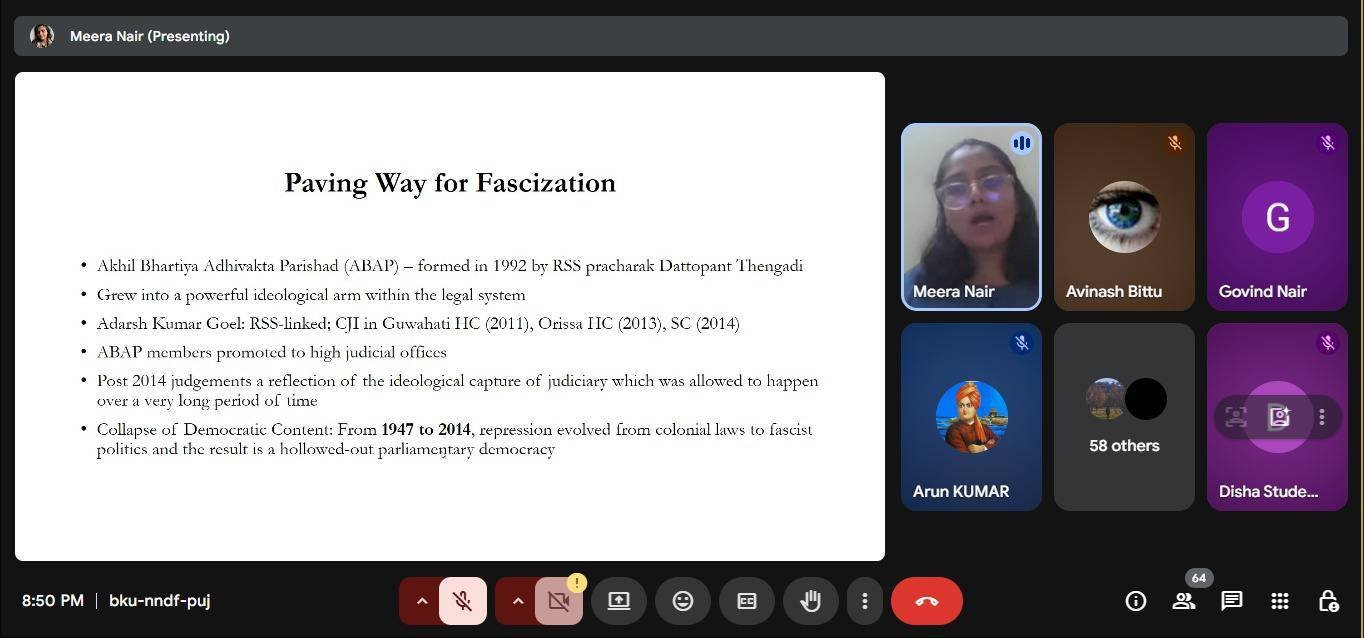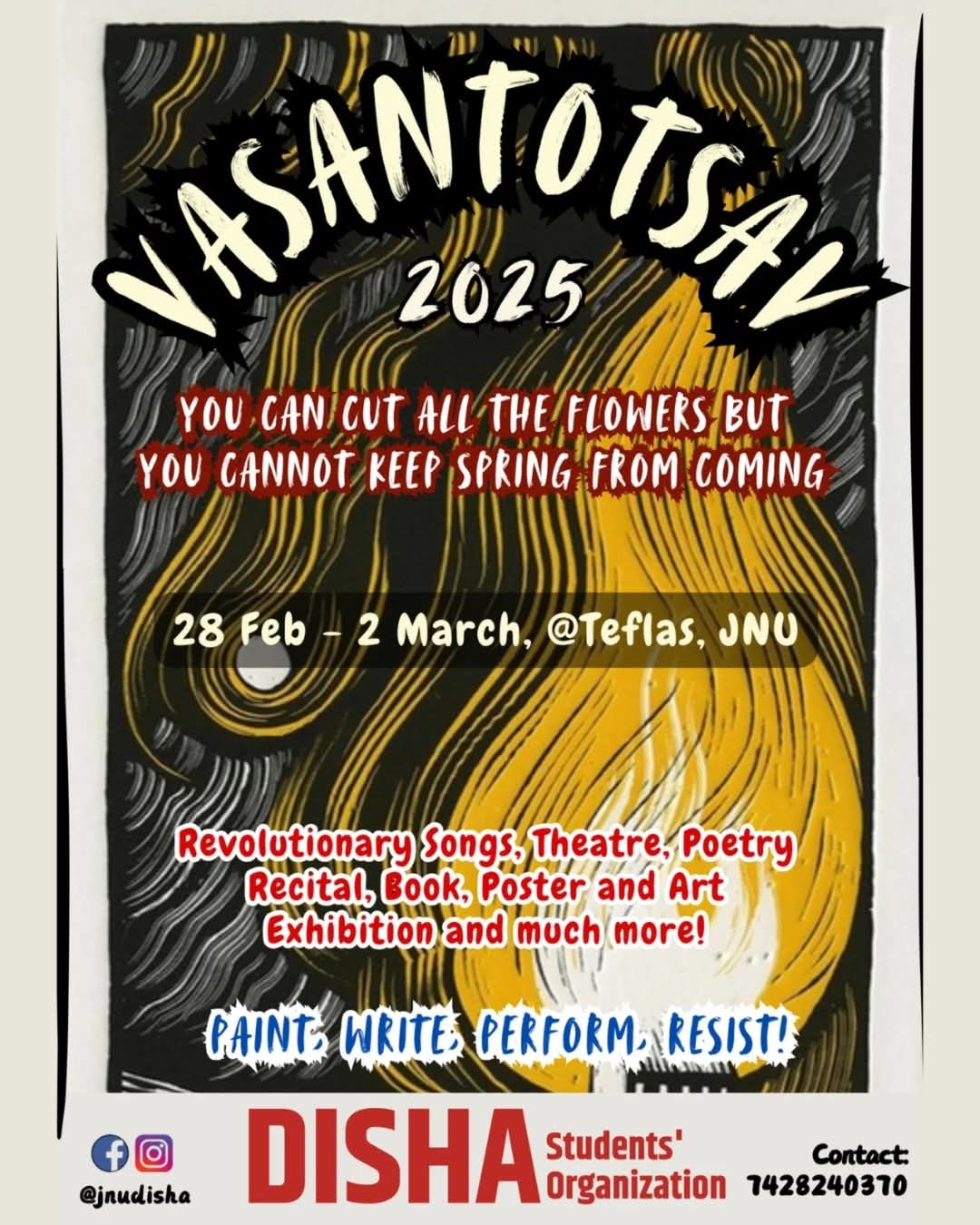Fascization of Judiciary: Process & Implications
On July 13, 2025, Disha Students’ Organization organized an online discussion session on the following topic — Fascization of Judiciary: Process & Implications.
In the beginning, Avinash introduced the subject of the conversation by acknowledging the widespread presence of fascism in the judiciary. It was then mentioned that a correct analysis of the process of fascization is essential to better formulate a strategy to deal with its implications.
Later, underlining that fascism in India is a 100-year-old phenomena, Govind briefly outlined the legal landscape — governed primarily by the Indian Constitution — which allowed such a project to proliferate relentlessly after independence. Among other things, emphasis was laid on how the promise of fundamental rights of citizens is undone by umpteen caveats in the form of “reasonable restrictions” in express terms by the Constitution. It was argued how this has encouraged the judiciary to interpret cases as per its own convenience, leading to a polyvocal court. Other points of elaboration concerned the facade of “socialist principles” in the directive principles of state policy, draconian emergency powers of the state and prominent ommisions with respect to rights of housing, health, education, refugees in the initial text of the Constitution. In conclusion, it was summed up how the these anomalies in the text of the Constitution have actively encouraged state repression and the curbing of civil liberties, all while aiding the the rise of fascism.
Building on this foundational analysis, Meera spoke about the betrayal of the common masses at the hands of the legislature and the judiciary between 1947 and 2014, with the manifest blessings of both old and new laws. Drawing from the observations of the top court in landmark judgements like AK Gopalan, Kesvanand Bharti, ADM Jabalpur and the Ram Janmabhoomi dispute, her talk elaborated how the entire legal apparstus and judicial system has — in totality — only strived to serve the interests of the ruling class while throwing in occasional performances of progressivism. Specific emphasis was laid on the state repression and the suspension of civil rights during the Emergency imposed by the Indira Gandhi-led Congress in 1975. Importantly, the talk spoke about how this period also saw the infiltration of those affirming the ideology of the Rashtriya Swayamsevak Sangh in each institution through various bodies like the Akhil Bharatiya Adhivakta Parishad. In the final analysis, it was argued that historical evidence tears apart the view of the judiciary as a neutral arbiter and the myth of progressivism that supposedly existed before 2014. It was also mentioned how the so-called “progressive” parties like the Indian National Congress cannot be relied upon to fight the fascists effectively, since it is precisely their reign in power which has led to the present situation.
Subsequently, the acceleration in the fascization of judiciary after Modi’s rise to power in 2014 was laid bare at length by Ashay. The talk focused on pivotal events concerning the judiciary in the past 11 years. The unprecedented press conference held in 2018 by four senior Supreme Court judges, the death of Judge Loya, the Yashwant Verma corruption case — and the fact that no genuine changes were prompted by these events — all formed part of the analysis. In particular, “retirement bonuses” accorded to retired judges who were known to favour the ruling BJP were also explicated in detail. In doing so, it was argued that still choosing to believe in the so-called separation of powers is as dangerous as it is naive. Furthering Meera’s observations, the pronounced influence of bodies like the Akhil Bharatiya Adhivakta Parishad after 2014 — in bar associations, courtooms and even union cabinets — was detailed extensively. Their role in curating biased fact-finding reports that favored Hindutva fascism during and after riots was specifically stressed upon. Finally, the talk could not have been conducted without emphasizing on the criminalisation of dissent, a reality that is supported by the ever-increasing list of political prisoners in “New India”. The role of judiciary in this aspect, either as a bystander or as a contributor, was also mentioned. Summarising everything, it was argued that marked features of fascism — the criminalisation of dissent, infiltration in institutions, othering minorities — became more pronounced after 2014 and the judiciary actively aided this process of acceleration.
Another speaker, Rakshandha continued the talk by speaking of the strategy to engage with the prevalent situation. She summarised the varying points raised by speakers, emphasizing once again of the fascist character of the current ruling party and the judiciary’s legitimisation of its policies. In the end, she spoke of the need to protect the rights that remain, despite the prevalent situation, by aggressively fighting for them through the available legal channels.
Concluding the talk, Apoorv mentioned how it is important to view fascism in India as a movement fueled by the interests of the capitalist class. Learning from past mistakes, the fascists in India have retained the shell-form of parliamentary democracy to create an illusion of a liberal democratic state which recedes into oblivion with each passing day. In this novel form of fascism, the judiciary has a huge rule to play in upholding ruling class interests while deceiving the masses of its hidden class character. He also spoke about how the judiciary of a particular state has never disregarded the interests of the ruling class and has always strived to maintain the status quo. As activists, these limitations must be kept in mind while engaging with the judiciary in any capacity.
After the conclusion of the formal presentation, the call was opened for discussions. Questions were raised regarding the collegium system, supposedly neutral propositions like the Uniform Civil Code, the role of International Law, and other related topics. Agreeing with the essence of the points raised by the speakers, it was agreed upon that no pretentions regarding the judiciary’s independence must be held by conscientious and alert citizens and the need to proceed towards a sound strategy to engage with the situation was expressed.



